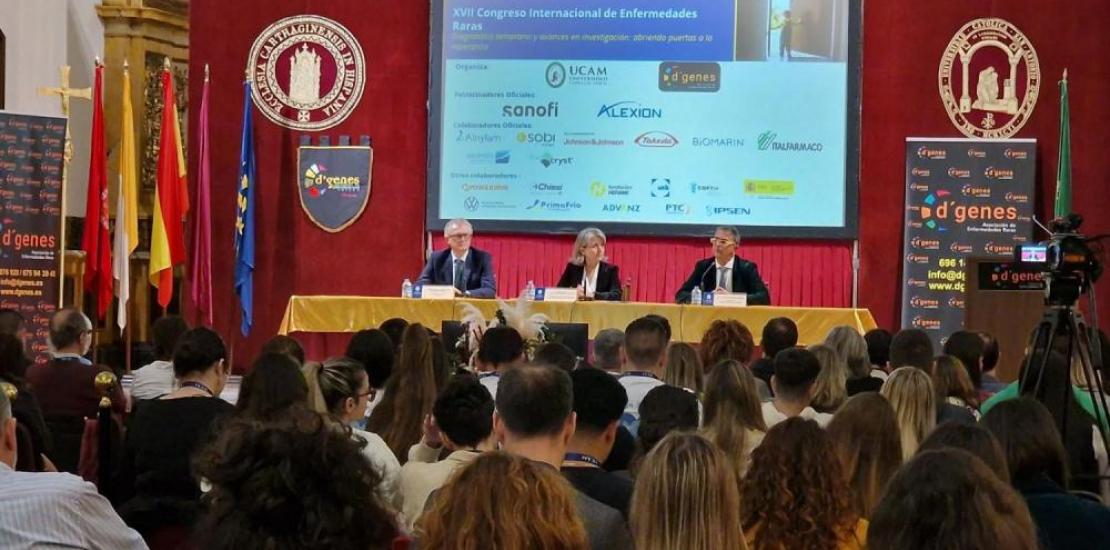Joining forces to achieve early diagnosis and equitable treatment of rare diseases
D'Genes and UCAM host patients, families and experts in a leading international forum on rare diseases
Under the slogan 'Marching together towards equity in diagnosis and access to treatment', UCAM has hosted the opening of the XVII International Congress on Rare Diseases organised by the D'Genes Association of Murcia which was attended by some 250 people. This event brings together patients, relatives, associations and leading experts to discuss the challenges and advances in this field.
The voice of families, the heart of the congress
Gladis Hernández, mother of a seven-year-old boy affected by vascular Ehlers-Danlos syndrome, shared her experience: ‘When we were given the diagnosis, although it was a very hard blow, we were relieved to know how to call what was happening. Early diagnosis is essential to deal with these diseases and, above all, to avoid major complications.
María del Mar Crespo, who has been affected by incontinentia pigmenti since childhood, stressed that ‘we are the same as any other person, and we should not be treated differently because we have a disability. Education and awareness-raising are key to overcoming prejudices’.
Both testimonies highlighted the importance of emotional support and associative networks, such as D'Genes, for those facing these rare pathologies.
Committed authorities
The inaugural event was attended by Juan Carrión, President of FEDER and D'Genes, who recalled that ‘early diagnosis and equal access to orphan drugs are the pillars to improving the quality of life of patients. In Spain we still face an average of five years to get a diagnosis, which in many cases is too late.
Likewise, Juan José Pedreño, Regional Minister of Health of the Region of Murcia, pointed out the importance of continuing to make progress in order to improve the time in which diagnosis is achieved: ‘We have implemented a pioneering rare disease registry and expanded neonatal screening tests, essential measures in moving towards a more inclusive and effective healthcare system’.
Estrella Núñez, UCAM vice-rector for Research emphasised the commitment of UCAM to D'Genes and FEDER: ‘In addition to training future professionals, we work on cutting-edge research projects to develop innovative treatments. This congress is an educational tool for both our students and society.
Congress milestones and debates
The opening day addressed issues such as access to orphan drugs and advances in genetic diagnostics. The round table on innovative therapies and the presentation of initiatives such as the ‘Tooth Fairy Project for Rare Diseases’ stood out.
The programme for the second day (tomorrow, Saturday) will include presentations on humanisation in healthcare and inclusive education. The best oral communications and posters presented by young researchers will also be awarded.
As in all previous editions, the event will be attended by leading experts such as Beatriz Martínez, head of the Molecular Genetics and Genetic Diagnosis Unit (Institute for Research on Rare Diseases - Carlos III Health Institute); Miguel del Campo, medical geneticist at Rady Children's Hospital-San Diego and associate professor at the University of California San Diego, and Belén Pérez, professor of Biochemistry and Molecular Biology at the Autonomous University of Madrid and deputy director of the Centre for the Diagnosis of Molecular Diseases (CEDEM), among others.
A loudspeaker for hope
This congress is not only a scientific forum, but also a space to make the realities of those living with rare diseases visible. As Hernández pointed out: ‘Change begins when we listen to each other. We need to work together: families, professionals and authorities. Only like this way will we build a more inclusive society.’




